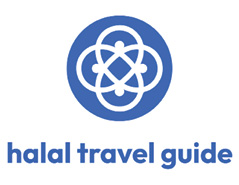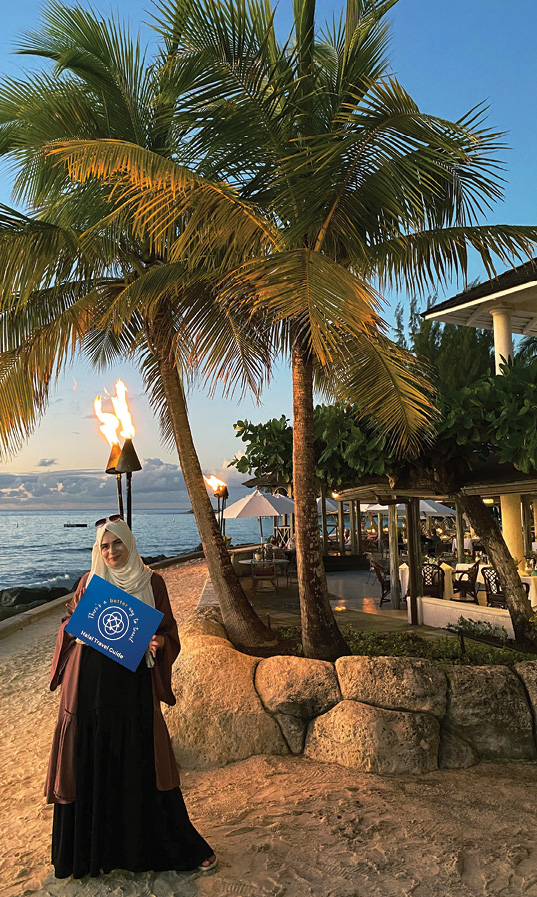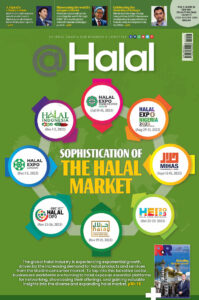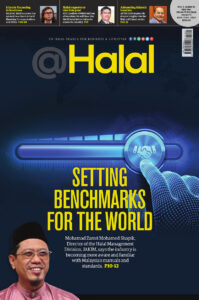A call for representation, compelling storytelling, meaningful experiences, and connection

Halal Travel Guide, a UK-based travel company, passionately endeavours to curate exceptional tours tailored for Muslim travellers, serving as a bridge to unforgettable experiences that benefit both adventurers and the local communities they visit.
The potential is significant as the Muslim travel market in Europe emerges as a robust force. Yet, there is a lack of targeted services for the growing population of second and third-generation Muslims.

In this edition of R&R, Halal Travel Guide CEO Soumaya Hamdi provides valuable insights into the European Muslim travel market, delving into its issues, opportunities, and challenges.
The burgeoning Muslim travel market in Europe presents a compelling opportunity for industry players to leverage. Soumaya said businesses must possess strategic insights, a deep understanding of consumer behaviour, and a keen awareness of the factors influencing Muslim travellers to tap into this potential.
Within the UK and Europe, a substantial demographic of second and third-generation Muslims is entering a phase of heightened financial capacity, offering a unique window for tailored travel services. Despite this, there is a notable gap in the market, with limited branding and advertising efforts targeting this demographic.
“I often think of us as the forgotten generation – millions of young Muslims living in non-OIC countries who have the means to travel, but we aren’t being targeted (in travel terms of branding and advertising) anywhere near as much as our counterparts in The Gulf or Southeast Asia.”
2. Emphasising storytelling
Soumaya highlighted that storytelling is the secret sauce for Muslim-Friendly Tourism and Hospitality (MFTH) players to tap into the European Muslim travel market. It’s about understanding that European Muslim travellers seek quality, meaning, and experiences that reflect their values.
“They’re looking for connection. With a large segment of the Muslim travel market using social media to plan their travels from start to finish, it’s crucial that MFTH players invest more heavily in this method of connecting with their target market.
“Our experience with the Muslim-friendly Cordoba campaign is a testament to the power of storytelling and organic content. We reached over 633,543 accounts without spending a penny on ads. Instead, we focused on showcasing visibly Muslim travellers enjoying Cordoba’s halal food, being immersed in the Islamic heritage, and meeting and connecting with the locals.”
The Muslim-friendly Cordoba campaign results from the Fundacion Las Fuentes’s engagement with Halal Travel Guide. The campaign was to address the issue of travellers only dedicating a short period to Cordoba, resulting in minimal local impact. The campaign had Halal Travel Guide featured Muslim-friendly offerings like halal restaurants and attractions on its website and social media. The initiative received positive feedback and reached over 600,000 people through organic content, highlighting Cordoba’s rich Islamic heritage.
3. Visibility and appropriate representation
Regarding the primary challenges for MFTH players targeting European tourists, Soumaya said visibility and appropriate representation were the biggest hurdles. Despite a significant Muslim population in Europe, their needs and preferences often go unnoticed in mainstream travel marketing.
“The key? Representation matters. Our research shows a strong preference for destinations that visibly welcome Muslim travellers in their marketing. Halal Travel Guide research shows that 78 per cent of Muslim travellers agree that ‘seeing a visibly Muslim person on a destination’s travel branding and advertising makes them more likely to visit that country’.
“What’s even more interesting is that this doesn’t only apply to non-OIC countries either. We found that 70 per cent of those surveyed said they are more likely to visit an OIC country that has ‘a visibly Muslim person on their travel branding and advertising’.”
Soumaya noted that OIC countries could sometimes forget to market to Muslim travellers in Europe. As a result, although Muslim travellers know these destinations have halal offerings, there is a gap in the knowledge market about where to go and what to do.
4. Europe’s young, tech-savvy Muslim travellers
Commenting on the prevailing demographics, trends and travel preferences among Muslim travellers from Europe, Soumaya said the face of Muslim travel was young, educated, and tech-savvy, heavily influenced by social media platforms like Instagram and TikTok.
“They are used to using technology to solve their problems and use it to experience the world and express themselves. They have grown up in environments where public understanding of Islam is limited or skewed by the media and value experiences that enable them to feel proud of their Islamic heritage. They value their faith and seek experiences that affirm their Islamic heritage. They want connection.”
In a 2021 survey by Halal Travel Guide, 96.5 per cent of Muslim travellers shared a preference for connecting with locals and learning about their Islamic heritage during their journeys. This reflects a strong desire for genuine connections, not just with places but also with people and cultures.
“It’s about more than just a holiday; it’s about enriching journeys that foster understanding and pride in one’s faith. As destinations look towards more sustainable travel solutions in the longer term, it’s worth noting that this segment of the Muslim travel market can provide solutions towards that,” Soumaya concluded. – RnR








